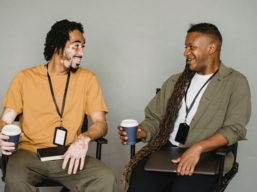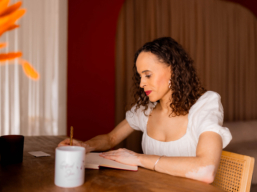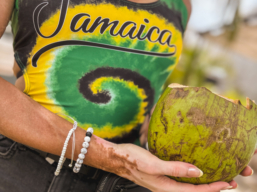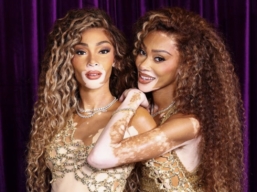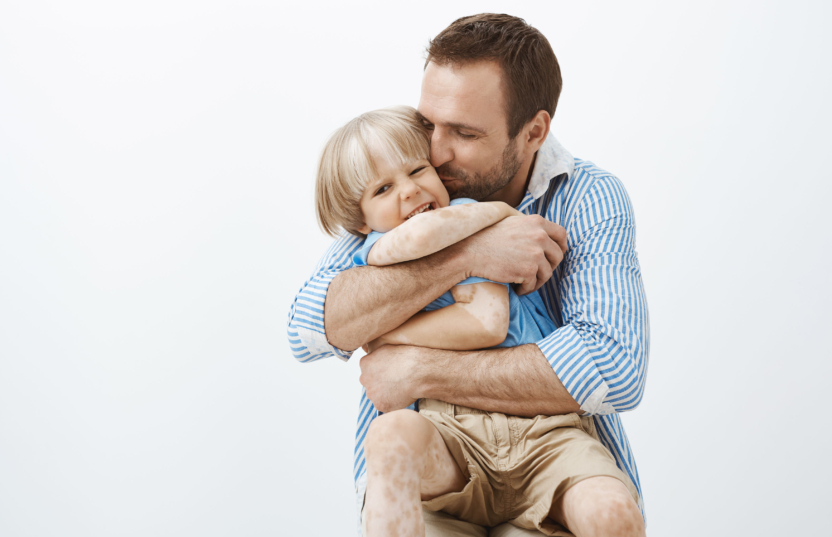
Your Child Just Got Diagnosed with Vitiligo – Here’s What I Wished My Parents Knew
As a parent, hearing the words “it’s vitiligo” when you’ve already likely spent weeks or months worrying about your child’s skin, can feel like devastating news. There is so much to process when your son or daughter is diagnosed. Where did it come from? Will it get worse? How will it impact them as they start to understand they are different and how will they be treated by their peers at school? These are tough questions to navigate and ones which we don’t often have immediate answers to.
Thankfully, given the current world we live in where information is more instantly accessible through search engines and social media, some parents may already be armed with some information having done their own research before visiting their GP and getting an official diagnosis.
I was diagnosed as a young girl, so from very early on my parents became my protectors and lead the way in instilling me with confidence when I didn’t even know I was different. They spoke on my behalf when adults questioned my skin (yes, that happened often!) and explained what it was when people stared. As I reflect on my younger years with vitiligo and think about how the world now understands vitiligo and how we are more globally connected, here are some things I wish my parents knew when I was diagnosed:
That treatment doesn’t have to be your first thought. When I was diagnosed the first thing my parents asked through fear of the unknown was ‘how do we treat it’. Back when I was young, this was probably the most normal next step after diagnosis. Social media didn’t exist and we didn’t live in a world where conditions were embraced and accepted and so the initial thought was finding a cure, even if it didn’t exist! However, the real concern here was that vitiligo was something that needed to be fixed.
Since the days when I was diagnosed, we’ve thankfully seen a shift. Now, there’s a growing awareness that treatment is a choice, not a necessity. While some may still want to explore treatment options, others are choosing to embrace their skin. Social media has given us the space to connect, to see people thriving with vitiligo, to understand that confidence doesn’t come from erasing difference but from being proud and owning them.
After that initial conversation with your GP or Dermatologist, I would suggest taking some time to digest the diagnosis. Of course, discuss treatment options but don’t make it the centre to what’s going on for your child. Talk to your child, see what they think (if they are at an age where they understand) and discuss the potential psychological impact and ways that could be managed, with your GP. Ask questions in support groups to see how other parents have navigated life after a diagnosis and build your community. Keep your options ‘open’ and don’t fixate on treatment as the best way forward.
You don’t have to panic! (But the chances are you will). Feeling unsettled and unsure about a diagnosis is natural. You’ll likely have so many questions – will it get worse? What next? How did this even happen?
It’s important to try not to let fear take over. There are support groups filled with people who truly understand what you are going through, advocates who already been on the journey and can offer guidance, and a wealth of resources to help you navigate your emotions and provide next steps. Your family and loved ones may not have all the answers, but they can offer support, a listening ear and be there when you need them to.
Most importantly, give yourself time. A diagnosis doesn’t change who your child is – it’s just a new part of who they are and you get to help navigate their journey and support them along the way.
It’s not as bad as it sounds. Your child can be confident in their skin despite it not feeling like that in the moment. It’s hard to envision a confident child when coming to terms with the change and knowing what other kids can be like. In that moment it can feel like things are falling apart as you visualise your child sitting in a classroom surrounded by kids who look very different to them.
Children are resilient and with guidance, teaching and educating them about what their condition is, they can develop the confidence to explain what it is, manage difficult situations and talk about their skin with pride. I’ve heard so many kids of late giving talks to their class about living with vitiligo and them being applauded for their braveness. It’s opportunities like this that opens the gate to conversations and nurtures and encourages long term confidence.
There are some amazing Dermatologists out there. We talk about the GP / Dermatology experience a lot, as this is often the foundation to a person’s vitiligo journey. Unfortunately, a frequent experience for parents is that they often feel dismissed and as though their child’s diagnosis isn’t managed with empathy or sensitivity and they come away feeling worse. But let’s not forget there are some incredible GP’s and Dermatologists who do recognise the psychological impact. They take the time to listen, offer reassurance, and provide not just medical advice but also emotional support. These professionals recognise that vitiligo isn’t just a skin condition, it’s a psychologically damaging condition that affect confidence, self-image and mental well-being.
Finding the right specialist can make all the difference. If your experience with a doctor leaves you feeling unheard, don’t be afraid to seek a second opinion or connect with professionals who approach vitiligo with the care and understanding it deserves….
Please support our work! You've enjoyed 1 article this month and we hope you have found it useful. Our work is entirely funded by memberships and donations, so please consider joining our charity today and supporting our work.
Already a member? Log in

